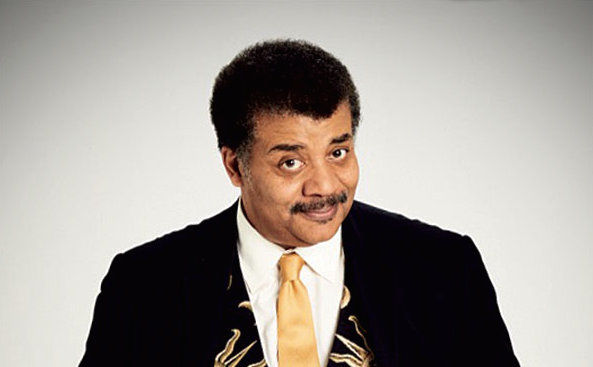Quick Q&A: Neil deGrasse Tyson

What’s the most common, constantly repeated mistake you see in science-fiction movies?
I have an entire category of those, which I call “mistakes I’ve given up on.” The biggest is where you actually hear explosions in space, or hear spaceships whizzing by. There’s no air in space, so there’s no sound. The original Alien got it right when its marketing materials said, “In space, no one can hear you scream.” Well, no one can hear your spaceship, either.
So you must be a real wet blanket at the theater.
I’m not the total a-hole that people think I am. My goal is to enhance your movie-going experience, not to be the annoying person who says, “That can’t happen.” I’m stereotyped as someone who sort of nitpicks science facts. But my motives are deeply misunderstood. I’m guided by Mark Twain, who once said, “First get your facts straight, then distort them at your leisure.” If you do your science homework and you can see that foundation, then I celebrate the creativity you layer on top of that.
You talk for two hours about science in movies. How do you pick which films to spotlight?
There are movies that get most of their science correct. I don’t highlight those. What interests me are films that are supposed to get the science right, but get it wrong in ways that affect the plot. And I like movies where there’s no premise of good science, and they happen to get some of it right. We’ll go through about 30 movies, with clips. There’s everything from Incredibles 2 to Star Wars.
Yet a movie that gets the science wrong can still win your stamp of approval, if it’s entertaining?
Absolutely. When Gravity came out and I started citing things it got wrong about the zero-g experience, people said that I hated it. Well, I loved the movie. But how is it that Sandra Bullock’s bangs always knew what direction “down” was? In zero-g, your hair is always floating.
Which film gets the most things right?
I think The Martian owns that category. Lots of attention was given to detail. One of my highest compliments was from Andy Weir, the author of the novel upon which the film was based. He said that while he was writing it, he imagined that I was looking over his shoulder, and he didn’t want me to tweet about something he got wrong. There’s only one flaw in the movie—there’s a windstorm on Mars blowing over their rocket ship. Martian air is 1/100th the air pressure of Earth. So high winds on Mars feel like you’re gently blowing on someone’s cheek. But he needed that for the story, so I give that to him.
Any examples of two movies that got the same issue very right and very wrong?
Deep Impact, about an asteroid hitting Earth, did a very good job with the science. It came out at roughly the same time as Armageddon, which violates more laws of physics per minute than any other movie ever made.





